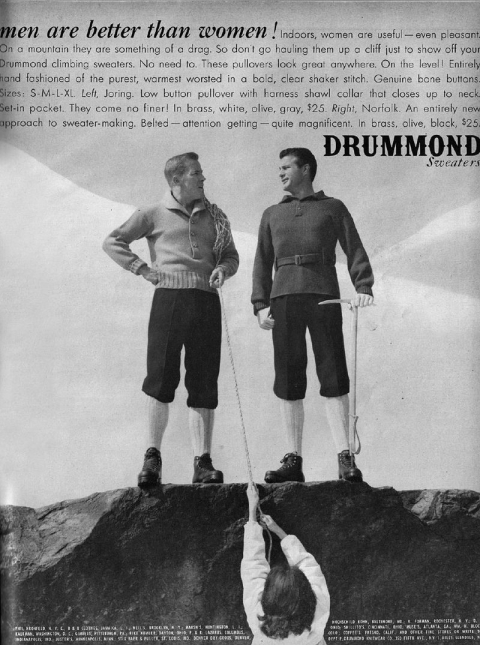An institution that I have found to define gender and or sexuality to me is the institution of Marriage and how it is depicted in commercialism and media. Ever since I was little, it was clear to see the split divide between those two adults raising me. The gender roles of the man and the woman have been strictly decided upon and defined in my culture. If you look at the media in the 50’s, 60’s, and 70’s, it’s very plain to see the obvious gender roles defined by commercialism. Almost every ad was based around gender roles, whether it is targeting the woman or the man, they’d target each gender through the roles that they were instructed by society to play. Such as in this ad for Drummond Sweaters.
In the ad, it states, “Men are better than women!” and that, “Indoors women are useful…On a mountain they are something of a drag.” Right away, the text establishes the man as the superior and dominant figure as he is “better” than the woman. Next, it moves on to say women are “useful” indoors, basically grouping woman in the same category as appliances much like a vacuum or a stove. Also, in the ad’s picture, you can see two men boldly standing on top of a mountain, exemplifying their physical dominance/prowess, while hanging on to a rope struggling to climb the mountain is the woman, physically weak and a bother to the men. Through media/commercial ads such as these, society came to view women as the submissive tool at the disposal of the man. These depictions drifted into the home life and marriage. As you can see in any old school sit-com, the father figure is strong, a leader, and king of the household. While the woman is automatically depicted as the submissive housewife who cooks, cleans, and does anything the man wants; she is the caregiver looking to please her husband before her own needs. Everything the woman does is to please the husband. She cooks him food because
 he’s hungry, she cleans the house so it looks presentable to him; she does everything for him and society copied this formula. However, the old school gender roles assigned in Marriage are seen as very sexist and unfair today. Movies of more recent times have even challenged the gender roles placed upon husband and wife, look at Daddy Day Care. It’s a movie where, uncommon to society, the man becomes the caregiver of the household and takes care of the children (but not without some hilarious hi-jinks). Also, Mr. Mom can be seen as a great example of society flipping gender roles, where the father unconventionally is placed in the mother’s role and what happens as a result of that. It’s not certain whether movies that flip the gender roles of marriage are meant to erase the line of gender stereotypes or to cement them as a result of what goes wrong when these gender roles are switched, but movies like Daddy Day Care and Mr. Mom do raise questions and challenge the stereotypes and gender roles that society has implemented into the institution of traditional Marriage.
he’s hungry, she cleans the house so it looks presentable to him; she does everything for him and society copied this formula. However, the old school gender roles assigned in Marriage are seen as very sexist and unfair today. Movies of more recent times have even challenged the gender roles placed upon husband and wife, look at Daddy Day Care. It’s a movie where, uncommon to society, the man becomes the caregiver of the household and takes care of the children (but not without some hilarious hi-jinks). Also, Mr. Mom can be seen as a great example of society flipping gender roles, where the father unconventionally is placed in the mother’s role and what happens as a result of that. It’s not certain whether movies that flip the gender roles of marriage are meant to erase the line of gender stereotypes or to cement them as a result of what goes wrong when these gender roles are switched, but movies like Daddy Day Care and Mr. Mom do raise questions and challenge the stereotypes and gender roles that society has implemented into the institution of traditional Marriage.
So I'm not sure if you were talking about marriage as in getting married or if you were referring to Marriage being a movie or something since you had it capitalized. Also, you did a good description of how marriage 50 years ago was very gender stereotypical, but what specific examples influenced your first thoughts on gender and sexuality? Since I'm assuming you didn't grow up in the 60's haha. I saw you mentioned your parents taking on specific gender roles, but how?
ReplyDeleteI agree with Rachel on the first part, I'm not sure why marriage is capitalized. I also agree with you about the change in gender roles. There has been a shift in society since the 50's, but is it a bad thing? The first ad seems very negative and disrespectful, it's better that this is no longer the norm.
ReplyDelete